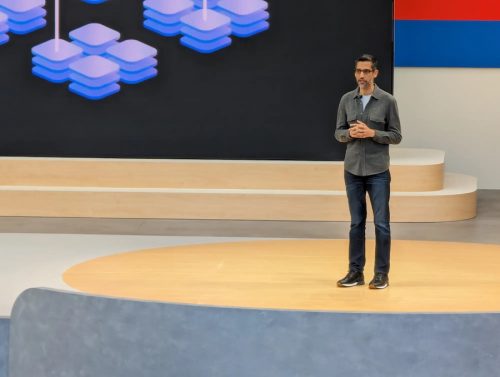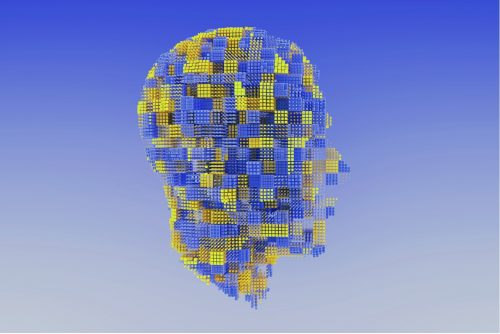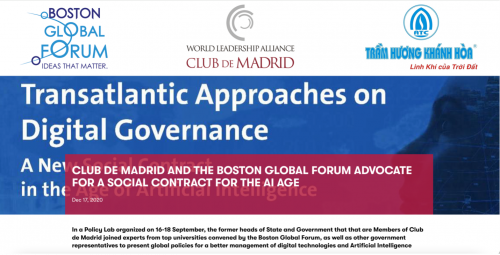Transatlantic Approaches on Digital Governance: A New Social Contract in Artificial Intelligence
|
Description: |
The World Leadership Alliance‐Club de Madrid (WLA‐CdM) in partnership with the Boston Global Forum (BGF) is organizing a Transatlantic and multi‐ stakeholder dialogue on global challenges and policy solutions in the context of the need to create a new social contract on digital technologies and Artificial Intelligence (AI).
Over the years, Transatlantic relations have been characterized by close cooperation and continuous work for common interests and values. This cooperation has been essential to enhance the multilateralism system, considering the shared principles from both sides on democracy, rule of law, and fairness.
By comparing American and European approaches in the creation of a new social contract on AI and digital governance, under the critical eye of former democratic Heads of State or Government, this policy dialogue will stimulate new thinking and bring out ideas from representatives of governments, academic institutions and think tanks, tech companies, and civil society, from both regions.
At the same time, the discussion will generate a space to encourage and strengthen Transatlantic cooperation on the new social contract of digital governance in the framework of needed reforms of the multilateral system. Special attention will be focused to engage technological companies as key stakeholders of digital governance, while protecting democratic mandate for public policy‐makers. |
|
Objectives: |
• To help leaders from both sides of the Atlantic to engage technological companies as key stakeholders of digital governance while protecting the democratic mandate of public policy‐makers.
• To generate action‐oriented analysis and policy recommendations to strengthen the role of the multilateral system in shaping a common digital governance, following the call for action of WLA – CdM’s 2019 Policy Dialogue on ‘Digital Transformation and the Future of Democracy’, and the Boston Global Forum’s (BGF) work on the AIWS Social Contract 2020 and AIWS Innovation Network. |
|
Activities: |
The policy discussion will:
• Offer a multi‐stakeholder platform to stimulate innovative thinking in the new social contract on digital governance in the framework of Transatlantic cooperation. |
1. Rationale
Digital technologies are rapidly transforming society. Critical infrastructures of all kinds, from telecommunications to medical devices and financial services, increasingly rely on digital and artificial intelligence systems developed and operated by a small number of large technological companies. The technical complexity of digital technologies, coupled with the concentration of digital markets in the hands of a relatively small number of corporate giants, gives these an unprecedented leverage over public policy‐making processes aimed at governing the digital environment, both nationally and internationally.
While the benefits of inclusive consultations in public policy‐making have long been acknowledged and promoted by democracy advocates the world over, the UN Secretary‐ General’s High‐level Panel on Digital Cooperation, in its June 2019 report, recommends to push inclusion one step further by adopting a multistakeholder approach to digital policy making. International digital cooperation, it asserts, cannot be led exclusively by governments through multilateral efforts; it also requires cooperation structures that involve other stakeholders such as technological companies, civil society, academics and technology specialists to address the social, ethical, legal and economic impact of digital technologies in order to maximize their benefits and minimize their harm.
The rapid deployment and decentralization of new technologies and artificial intelligence beyond the control of States, as well as the digital interdependence in this globalized world, presents itself as a current global challenge. It involves a division of responsibility that leads to a sweeping set of interrelated challenges for governments and the multilateral system and requires the articulation of collective responses at all levels.
The practice of multistakeholderism is not new. Multistakeholder initiatives have been burgeoning for over two decades, particularly in areas related to standard setting. In the digital sphere, examples of long‐standing multi‐stakeholder initiatives include the Internet Engineering Taskforce (IETF), which has been setting technical standards related to internet protocols since 1986, and the Internet Corporation for Assigned Names and Numbers (ICANN), which has been managing the global domain name system since 1998. More recently, various national and international public bodies have also permanent multistakeholder structures to advise them on digital policy, such as the UN Secretary‐General’s Multistakeholder Advisory Group tagged to the Internet Governance Forum.
Multistakeholderism, however, poses fundamental questions related to the core principles of democracy. By devolving to private actors important functions within the public policy‐making process, multistakeholderism casts a shadow of doubt over the ability to deliver policy that meets the best public interest. While democratic governments are formed through representative systems and held in check by public accountability mechanisms, most participants in multistakeholder initiatives are motivated by private interests and free from any obligation of accountability to the broader community. The composition of multistakeholder initiatives – generally limited to a small sub‐set of all the physical and legal persons who may have stakes in an issue – also gravely limits their ability to represent the whole spectrum of views that may exist among the public, resulting in less inclusivity than may have been achieved through alternative approaches to inclusive policy‐making.
Yet, for digital governance, the unavoidability of engaging technological companies in policy‐ making remains. Their economic power, technical know‐how and ability to innovate not only gives them leverage over public authorities, but also puts them in a privileged position to develop solutions that use more digital technology to address the policy challenges posed by digital technology. Democratic governments and multilateral organizations based on member Member States’ decisions and policy‐making, therefore, are confronted with the challenge of redesigning public policy‐making processes for digital governance in such a way as to constructively engage technologies companies while protecting the democratic mandate of public policy‐makers.
The WLA – CdM’s 2019 ‘Call to Action’ to promote a democratic approach to Digital Transformation and the Future of Democracy, developed during WLA – CdM’s 2019 Annual Policy Dialogue and supported by its Members, invites world leaders to take proactive action to frame the development of digital technologies in an inclusive, fair and rights‐based legal, political and social framework.
What role is there for technological companies in democratic policy‐making? Is multistakeholderism, despite its democratic limitations, the lesser of all evils in digital governance? Or are alternative approaches to inclusive policy‐making more likely to deliver effective policy that meets the best public interest? How to balance the different sources of power to build a new social contract on AI and digital governance?
And on global level, is the proliferation of multistakeholder initiatives a sign of weakening of the multilateral system, or can it rather strengthen its capacity to act on digital matters? How to build an effective digital global cooperation between key stakeholders?
Answering these fundamental questions requires a thorough understanding of the practical application of democratic principles and a broad perspective over the workings of public policy making in democratic systems. WLA – CdM Members, who are all democratic former Heads of State or Government, are in a unique position to provide such perspective, building on their individual and collective experience of inclusive approaches to public policy‐making. This project proposes to bring them together with a variety of stakeholders from the digital community – technological companies, civil society organizations, academics and public policy specialists – to shed light on these issues.
In this context, the Boston Global Forum – a leading convener of open public discussions gathering thought leaders and experts from around the globe ‐ is a partner of choice. Its initiative on a new Social Contract in the Digital Age brings the idea to merge governments, citizens, technological companies, civil society organizations, digital assistants and multilateral organizations with the aim of promoting a balance of power, rights, obligations, and interests to achieve a common digital governance based on the principles of fairness, trust, transparency, and accountability.
Contrasting the North American and European experiences, where digital policy‐making is most dynamic, should allow for the formulation of recommendations for national leaders and policy‐ makers based on best practices and the most innovative ideas to build a new social contract on artificial intelligence and digital governance, which in turn serves to strengthen the role of the multilateral system in this area.
2. Objectives
In line with their common commitment to inclusive public policy making, the WLA‐CdM and Boston Global Forum propose to support national leaders and public policy‐makers from both sides of the Atlantic to identify ways of engaging technological companies as key stakeholders of digital governance while protecting the democratic mandate that underpins public policy‐ making. In this framework, conclusions and recommendations will also serve as inputs to strengthen the new social contract for artificial intelligence and digital governance, as well as the role of the multilateral system on these themes, harmonizing multilateralism and multistakeholderism approaches, and developing ways of using each to reinforce the effectiveness of the other.
3. Activities / Methodology
During March 2020, the policy discussion will start with an online dialogue where participants will share their inputs answering a series of questions about the themes that will be addressed.
In April, the policy discussion will last one and a half days:
- On the first day, a roundtable will be developed with approximately 30 participants, among which 15 WLA CdM Members and 15 experts in new technologies and artificial intelligence from different disciplines will be present ‐government, academy, civil society, technology companies‐. This roundtable will be divided into three thematic sessions.
- On the second day, the policy discussion will be an open event that will take place during half a day divided in three
4. Follow‐up
As a result of the policy lab, a report will be prepared with conclusions and policy recommendations on the issues addressed at the roundtable and in the plenaries sessions.
A second policy discussion will be held in the following months in Europe. After this event, a final report will be prepared.










